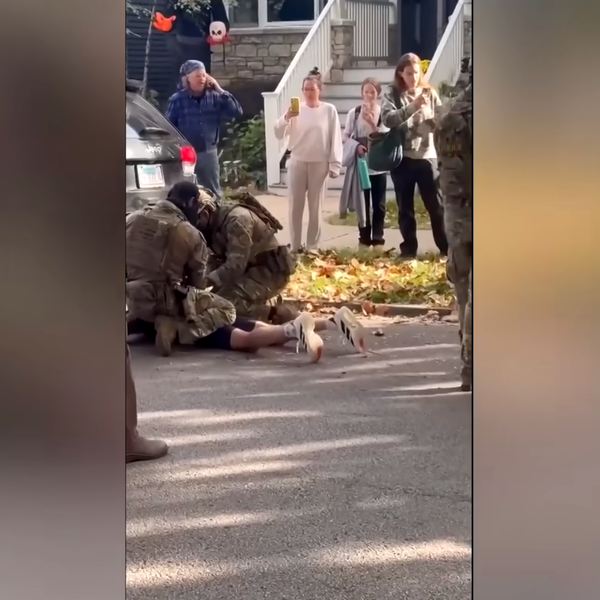Protesters have returned to downtown Oakland, California, to demand the resignation of the city's mayor and an investigation to explain how an Iraq war veteran, Scott Olsen, was hit in the head by a teargas canister at close range, leaving him critically injured.
About 2,000 people - half as many as Tuesday night - massed in front of City Hall on Wednesday, tearing down a steel barricade intended to keep them off the grass in Frank Ogawa Plaza.
When the city closed down a nearby underground station, preventing dispersing protesters going home, they organised a spontaneous march through the centre of the city, chanting: "Whose streets? Our streets!"
Police had been under orders to let them have the run of the plaza until 10pm. Officers stood guard at junctions in patrol cars and motorbikes to deter people from jumping up on to an overhead freeway. The police were more lowkey than on Tuesday, when they manned barricades around the plaza and fired volley after volley of teargas that filled the surrounding streets and smoked out businesses.
As the protest continued late into the night both sides appeared afraid of engaging the other. Many marchers wore scarves over their noses and mouths in anticipation of teargas. Some had gas masks.
When officers wanted the crowd to move out of a traffic intersection they sent an ambulance in with its siren blaring, not a police vehicle.
One sign taped to a lamppost delivered this message to the police: "You've fuelled our fire."
Speaker after speaker demanded the resignation or recall of the city's mayor, Jean Quan, who had initially voiced her support of the protesters. "Mayor Quan you did more damage to Oakland in one evening than Occupy Oakland did in two weeks," said one slogan scrawled near the entrance to her offices.
In an afternoon news conference Quan had struggled to explain the decision to clear the square in the early hours of Tuesday morning and again when protesters returned that evening.
She gave the impression she had been as blindsided as anyone by the decision to close down Occupy Oakland. She had been in Washington at the time and said that although she knew there were hygiene and public safety issues that needed to be addressed, she did not expect that to happen while she was on the other side of the country.
"I only asked the chief to do one thing: to do it when it was the safest for both the police and the demonstrators," she said, pinning responsibility for the decision on her police chief and the top city administrator. When pressed for more details, Quan said: "I don't know everything."
Scott Olsen, 24 - a former US marine who friends said served two tours of duty in Iraq - has become a figurehead among Occupy Wall Street supporters in Oakland and elsewhere. Organisers took to Twitter and other social media urging protesters back into the streets.
Acting Oakland police chief Howard Jordan told a news conference his department was investigating the injury to Olsen as a "level one" incident, the highest for an internal police inquiry.
In Portland, Oregon, a crowd estimated to number at least 1,000 joined in a march organised by the AFL-CIO labour federation in support of the anti-Wall Street movement.
Hundreds of protesters also gathered in New York to march in solidarity, leaving the Occupy Wall Street base in Zuccotti Park and marching around the financial district and city hall. Protesters in New York voted to send $20,000 and 100 tents to their peers in Oakland, according to a Twitter message from a protester identified as JA Myerson and retweeted by the Occupy Wall Street group.
The Oakland crowd was a mixture of eco-activists, families with young children, nurses and teachers, as well as a handful of young men with bandanas or Palestinian keffiyehs covering part of their faces. Many said they were shocked by what happened on Tuesday and were bracing themselves for further confrontations with the police.
"Quan let the [county] sheriffs in to do her dirty work and then said she didn't know who was responsible for the decision. She's got to go," said Robijn Vangiesen, a local activist and organiser.
Vangiesen was in the plaza when Olsen was knocked down by a teargas canister. "He was out, man. Totally non-responsive. He had blood pouring out of his nose," Vangiesen said. The initial teargas volley was followed by another projectile from the police straight into the small crowd trying to help Olsen. His friends said it was a flash-bang grenade, pointing to a video distributed on the internet as evidence, but police have denied this.
Many of Wednesday night's protesters expressed anger. "When the rich steal from the poor it's called business. When the poor fight back it's called violence," a 25-year-old solar energy company executive, Cory Rae Shaw, wrote on a banner.
"Who's really the bandits here?" said Demarion English, a 23-year-old security guard. "I called them bitches. I call the police bitches to their face. We're all fighting for a real cause... and we got teargassed."



